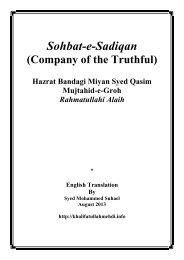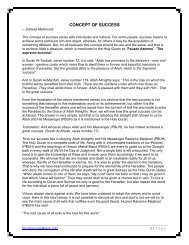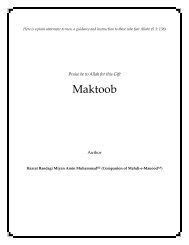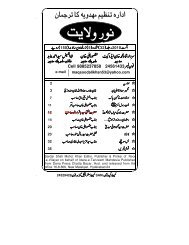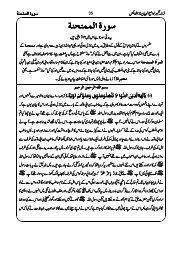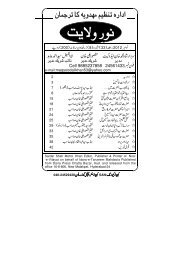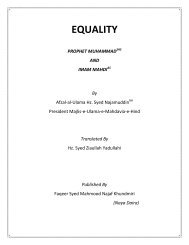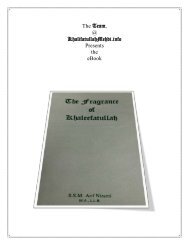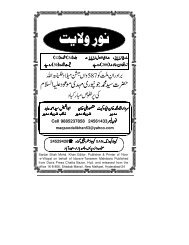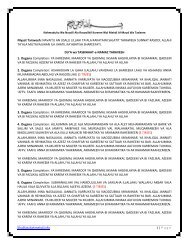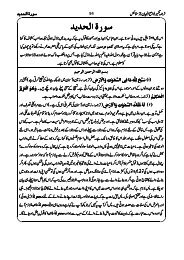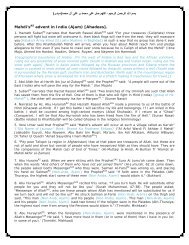Al-Qaul Al-Mahmood - Khalifatullah Mehdi
Al-Qaul Al-Mahmood - Khalifatullah Mehdi
Al-Qaul Al-Mahmood - Khalifatullah Mehdi
Create successful ePaper yourself
Turn your PDF publications into a flip-book with our unique Google optimized e-Paper software.
<strong>Al</strong> <strong>Qaul</strong> <strong>Al</strong> <strong>Mahmood</strong><br />
Hzt Syed <strong>Al</strong>i Yadullahi Makki Badey Miyan RH<br />
<strong>Al</strong>lah further says “And, for the love of <strong>Al</strong>lah, they feed the indigent, the orphan, and the captive.”<br />
It is obligatory on the person who spends in the way of <strong>Al</strong>lah to give the thing he likes most.<br />
Otherwise, what he gives would go reward less. <strong>Al</strong>lah says “By no means shall ye attain righteousness<br />
unless ye give (freely) of that which ye love….. “ (3:92). This shows that divine award is contingent upon<br />
your giving in the way of <strong>Al</strong>lah the best and most loved thing (in charity).<br />
DESIRE OF ALLAH’S VISION<br />
Another of the commandments of Imam Mahdi AS is the desire of <strong>Al</strong>lah’s vision. <strong>Al</strong>lah says “…<br />
whoever expects to meet his Lord, let him work righteousness, and in the worship of his Lord, admit no<br />
one as partner.” (18:110). Whoever hopes to meet <strong>Al</strong>lah should work according to His dictates and he<br />
should not include others in his worship of <strong>Al</strong>lah and His attributes (i.e., should not believe in and<br />
practice polytheism).<br />
It may be pointed out here that <strong>Al</strong>lah’s vision in this world (Here) is possible, according to the belief<br />
of Ahl-e-Sunnat (the followers of the Sunni Muslim sect). The explanation for this is that when Prophet<br />
Moses AS heard the word of <strong>Al</strong>lah and enjoyed it, he developed a desire to see Him. He, therefore, prayed<br />
to <strong>Al</strong>lah saying, “Lord show thyself to me that I may look at Thee (7:143).<br />
No doubt, if the vision of <strong>Al</strong>lah were impossible, Prophet Moses AS would never have made the<br />
request. Since he made it, the vision of <strong>Al</strong>lah is proved to be possible and permitted in this world (Here).<br />
Secondly, <strong>Al</strong>lah’s reply to Prophet Moses AS also shows that the vision of <strong>Al</strong>lah is possible and<br />
permitted. For <strong>Al</strong>lah his associated His being viewed with the stability of the mountain. In other words,<br />
He made His being viewed contingent on the mountain remaining stationary. “Thou will not see me, but<br />
gaze upon the mountain; if it stands still in its place, then you will see me.” (7:143).<br />
If the mountain remaining in its place is possible, anything contingent upon it should also be<br />
possible. <strong>Al</strong>l this goes to show the vision of <strong>Al</strong>lah in this world (Here) is possible….<br />
In his book, Futuhat-e-Makkiah, Shaikh Mohiuddin Ibn Arabi says that a thing that can happen in a<br />
dream or in the Hereafter can happen in this world also. In short the vision of <strong>Al</strong>lah is possible in this<br />
world. This is the reason why a large number of ulema (Muslim scholars) believe that Prophet<br />
Muhammad viewed <strong>Al</strong>lah through physical eyes.<br />
OPPOSITION OF IMAM MAHDI<br />
When people found Imam Mahdi’s commandments, described above, to be difficult to follow, they<br />
repudiated, abused, avoided and failed to repose faith in him.<br />
Imam Mahdi was externed from wherever he went. “To <strong>Al</strong>lah we belong, and to Him is our return.”<br />
(II: 156). But he went on demonstrating the Truth. Often people did not lead an ear to him. But his<br />
invitation to the path of <strong>Al</strong>lah continued unabated. He never bothered whether the crowds in his<br />
congregations were large or small.<br />
Let not the readers be under the impression that the matters, Imam Mahdi designated as<br />
obligatory (farz), have now been repealed. We (the author) hold that they have never been repealed.<br />
For, naskh (repeal) means that one Shara’i argument is superceded by a later Shara’i argument which<br />
contradicts the former. The commandments given by Imam Mahdi are not of this nature, for the simple<br />
reason that the “Later Shara’i argument” does not exist.<br />
<strong>Khalifatullah</strong><strong>Mehdi</strong>.info<br />
36 | P age



